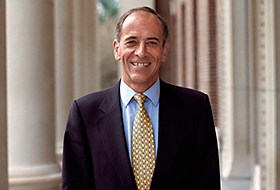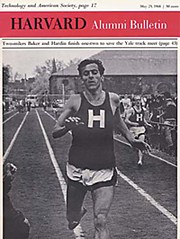The new president of the Harvard Alumni Association, James V. Baker '68, M.B.A. '71, had never been to America before he boarded the SS United States in Southampton, England, in 1964 for the journey to New York City, where he caught a Greyhound bus north. His host family, "the William H. Vanderbilts of Brookline, Massachusetts," met him at the Boston depot. "I had driven to Southampton with my parents and my trunk would not fit into the boot, so it was strapped on top of our family's car," the British native recalls. "When I arrived in Boston, my trunk disappeared into the trunk of Mr. Vanderbilt's car....It was the first indication to me of how much bigger most things were in the United States."
 |
| "People do not realize how far the Harvard name travels internationally," says James Baker. |
| Photograph by Jim Harrison |
Unlike the jet-setters among Harvard's student body today, Bakeran undergraduate on scholarshipventured home only twice in four years. The second time was as a member of the Harvard/Yale track team, for the biennial meet with Oxford and Cambridge. "And on that trip," he explains, "I met my future wife." Eleanor "Maggie" Smith had been promised a teaching job at Milton Academy, near Boston, and attended a party for the teams. "She was looking for someone from Harvard to tell her about Boston," Baker adds, "and ended up with a limey." (Their son, Christopher, is class of 1996.)
Foreign students were something of an anomaly at Harvard until about 1944, when the University opened the Harvard International Office to accommodate an influx of overseas students due to wartime closings of universities in Europe and Asia. By the time he was a senior, Baker was one of 162 foreign undergraduates at Harvard (as compared to 492 enrolled in 2002). His status as a self-described "pure Brit"and his record-breaking turn as the best distance runner of his era: he was inducted into the Varsity Club Hall of Fame in 1993probably helped him stand out among his classmates (he was also elected first class marshal). But his status has also influenced subsequent thinking about Harvard's increasing and, in his mind, necessary global reach. "People do not realize how far the Harvard name travels internationally," he notes.
 |
| Track star Baker made this magazine's May 25, 1968, issue cover. |
As HAA president, Baker wants to bolster connections with and among the University's 35,000 alumni abroad, look at how undergraduates are prepared for the international world (he mentions language education, internships, and study abroad), and discuss the manner in which international students are supported and integrated on campus. Expanding Harvard's relationship to the rest of the world is a rising priority at the University, he reports, citing a passage from the annual letter sent by William C. Kirby, dean of the Faculty of Arts and Sciences, to faculty members earlier this year: "Harvard has grown over the last century and a half from a provincial college into a national institution. We now face the challenge of becoming a truly international university."
Baker, who retired from Goldman Sachs International Ltd. as executive director of the company's U.K.-European equity-shares business in 1996, comes to the HAA's helm with ample experience in alumni relations, starting with his stint, soon after graduation, as an HAA elected director. An alumni interviewer since 1972, he served as the president of the Harvard Club of London (now the Harvard Club of the United Kingdom) from 1993 to 1997, before becoming the HAA regional director for Europe. He helped organize a London conference of club leaders that brought together officers from 16 clubs in 13 European countries, and, this November, he is slated to moderate the first-ever worldwide University alumni conference in London (see "Alumni Abroad," below). Other alumni conferences are tentatively planned for Latin America, Asia, and the campus in Cambridge.
In addition to his Harvard activities, Baker's post-retirement life has included work as a business adviser/mentor for the Prince's Youth Business Trust, an organization that provides seed money to disadvantaged young people starting their own businesses. "I've been doing it for six years, so I've had a relationship with two client businesses," says Baker. "Both of them have repaid their loans, I am glad to report." As governor of the Ashcombe School in Dorking, Surrey, he has recruited and interviewed new staff members and helped to redraft many of the school's policies and procedures. Baker and his wife live in Cobham, Surrey, about 20 miles southwest of London, but these days, he adds, "Maggie and I look on Cambridge as a second home, where we have as many friends as we do in Europe."





